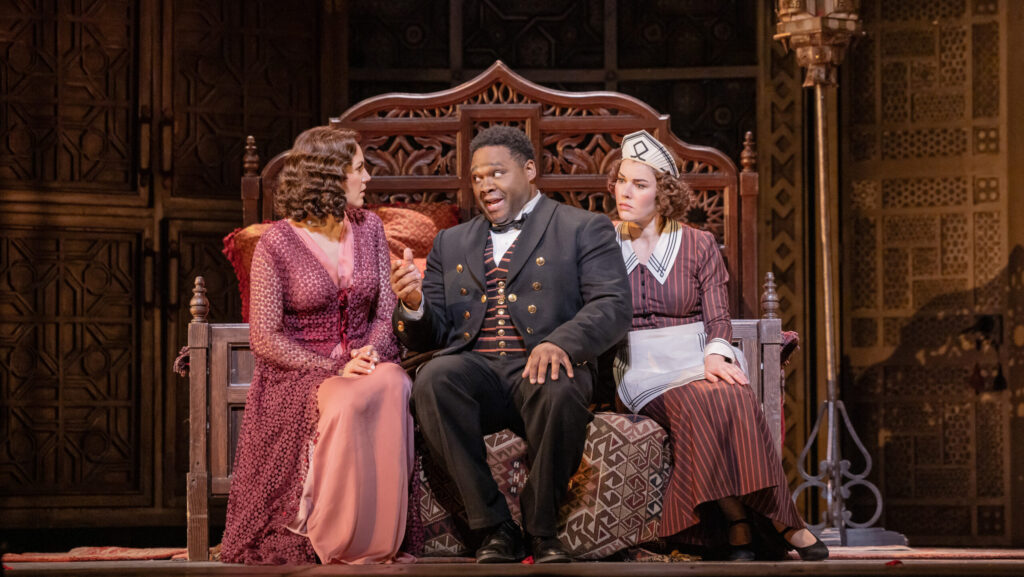
Evan Zimmerman/Metropolitan Opera
It is a testament to the fine direction and casting of the Met’s current production of Mozart’s Le nozze di Figaro that it can make the audience laugh. We didn’t titter politely in acknowledgement of the performers’ comic signaling, we actually laughed. This felt like nothing short of miracle, especially given the Monday night premier with a sleepy audience of office workers who haven’t had quite enough to drink at P.J. Clarke’s pre-show.
Richard Eyre’s playful, subdued production utilizes the Met’s rotating stage, with bedrooms, bower, and banquet hall cranking gaily around like a carousel. Pretty and inoffensive, the set design plays it safe. Set in a Spanish villa in the 1930s, thanks to the weird lighting it took me until Act IV to recognize that the latticed walls were meant to evoke Moorish grillwork. Why the 1930s? Perhaps for costuming purposes only: for Countess Almaviva to sweep magnetically across the stage, Veronica Lake-style, in glistening waves of silk. Cherubino also hams up his twee young lover routine in adorable 1930s drag, although, the performance was more Gilded Age Vaudeville than Weimar cabaret.
The topsy-turvy world of the opera nestles inside the production’s subdued chaos. Conductor Joana Mallwitz carries this muted zaniness throughout. The conducting had little discernable logic to it and yet swept upwards in some brilliant and chilling moments of giddy precision. It is a testament to the excellence of the cast that the performance was as good as it was. While there weren’t many moments of toe-tinglingly great singing, all roles had a substantive core to them, the acting was impeccable, and the physical comedy was winningly gonzo.
Bass-baritone Michael Sumuel was a charismatic Figaro. He minced, schemed, and speechified his way through the score, serving comically treacherous Tartuffe in “Se vuol ballare” and “Non più andrai.” Sumuel is also a superb physical comedian, gracefully weaving himself into the web-like stage direction. Mezzo-soprano Sun-ly Pierce as Cherubino laps up this trouser role as if she were born for it. One of the only truly standout voices of the show, her bell-like uppermost range was able to match the gorgeous pulsing maximalism of the orchestration.
Ukrainian soprano Olga Kulchynska brought energy and precise comic timing to the role of Susanna. Her excellent phrasing and flitting elfin vivacity conveyed the wretched anxiety of the put upon servant girl, alongside Susanna’s whimsical sweetness.

Evan Zimmerman/Metropolitan Opera
Mezzo-soprano Elizabeth Bishop performed as the pathetically lustful Marcellina. Her singing was upright and correct, if a little too stiff. However, her comic acting throughout, and particularly in the big reveal in Act III, had the entire audience guffawing. Performing opposite her as Dr. Bartolo was bass-baritone Maurizio Muraro. His voice was textured, circuitous, and concrete in a manner that made him seem like a singer from a different era, in contrast to the frothiness of the other performers. His singing conveyed the weary, gravelly sadness of his character and the zany carousel of the orchestration seemed to slow and focus during his primary scenes.
Baritone Joshua Hopkins as Count Almaviva and soprano Feederica Lombardi as Countess Almaviva had excellent, cinematic onstage chemistry. They evoked 1930s parlor comedies in their rigorous flights of comic jealousy. Lombardi is a generous performer, charmingly girlish in her bedroom scenes with Cherubino, and matching the bell-like tones of her boyish would-be paramour. Mei Gui Zhang as Barbarina, in the little time she has, shines with a wicked glimmer, appropriately outsparkling her cousin Susanna as she spins through the latter portion of the farce. Bass Paul Corona performed as Antonio with wide-eyed Old Testament ferocity, tenor Brenton Ryan as Don Basilio was chillingly cold, and tenor Tony Stevenson performed Don Curzio as a perfect doddering bureaucrat.
The best scene of the performance was probably when the count is searching for Cherubino in the countess’s bedroom. The actors move about the stage like clockwork, perfectly in sync, the stage direction matching the giddiness of the score. Hopkins is a hilariously dorky almost-cuckold, oblivious and eager to be fooled, his voice huffily stentorian as he is conned by one group of connivers after another.
I felt through all the laughter and hijinks, watching the escapades of a servant girl outsmarting her betters to avoid kidnap and rape, like I was being disciplined by Mozart’s class struggle opera buffa. The three-and-a-half-hour opera about the love lives and schemes of servants who connive to block an aristocrat from claiming his droit du seigneur feels oddly radical in 2025. In our techno-feudal times when clownish princes make a mockery of our government, Mozart’s satire of aristocratic largesse seems unfortunately still relevant. Who knows, with Trump now elected Board President at the Kennedy Center we may well be in for some Joseph II-style Hapsburgian censorship.


